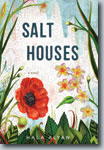

Salt Houses
Set against a backdrop of the Palestinian diaspora, Salt Houses tells a highly nuanced story of the
Yacoub family and its generations. Displacement, an undeserved curse, follows them wherever they go. From
the orange groves of Jaffa set ablaze by the troops of the new Israeli nation, to the pre-Gulf War housing
complexes of Kuwait, or the shopping centers of Beirut, Alyan brings the reader confidently into the proxy
homes that never quite succeed in matching the Yacoub's true home in Palestine.
The memory of home lingers inside them, even if they have never set foot there. As Salma, only a girl when
her family fled Palestine, is dying, she tells her daughter Alia �I saw the houses, I saw how they were lost.
You cannot let yourself forget.� Alia, hearing this outburst without context, doesn�t understand what her
mother means, but the reader grasps it immediately. After all, some families in Morocco, to this day hold
the keys to ancestral homes, lost when the Spanish conquered the last Islamic kingdom in Al-Andalus in 1492.
Everyone remembers, or tries to forget or accept, in their own way. Salma�s granddaughter Riham, almost
drowning at sea as a young girl, devotes herself to Allah. Her sister Souad, seeks shelter in the West,
first Paris, where she enters a hasty marriage at eighteen, and then to Boston, and back to Beirut with her
three children when her marriage fails. The stepson of Riham, Abdullah, falls in with older men advocating
Sharia law who make him and other dispossessed young men �feel like giants.� It�s not the big events that
make the novel so compelling but the deep observations of the personal ruptures that history causes in the
lives of an ordinary family that is this novel�s great achievement. Forgetting, we learn, is not easy. It
is not, in the long run, even possible. Rather than trying to explain such great losses, Halyan generously
gives us the keys to the many rooms in which the Yacoubs persist, in memory and in spite of it.
� Robin Hemley
2018 finalist judge
Book Excerpt
That house. The ones that came after. He thinks of them, instinctively touching the soil again. All the houses
they have lived in, the ibriks and rugs and curtains they have bought; how many windows should any person
own? The houses float up to his mind�s eye like jinn, past lovers. The sloping roof of his mother�s hut, the
marbled tiles in Salma�s kitchen, the small house he shared with Alia in Nablus. The Kuwait home. The Beirut
apartments. This house, here in Amman. For Alia, some old, vanished house in Jaffa. They glitter whitely in
his mind, like structures made of salt, before a tidal wave comes and sweeps them away.
�I thought I had more time � � Manar stops, embarrassed. Atef waits. �To ask her things.�
�About what?�
His granddaughter shrugs. �Her life.�
He can feel their eyes upon him. Poor innocent things, he thinks. What is a life? A series of yeses and
noes, photographs you shove in a drawer somewhere, loves you think will save you but that cannot. Continuing
to move, enduring, not stopping even when there is pain. That�s all life is, he wants to tell her.
It�s continuing.

|